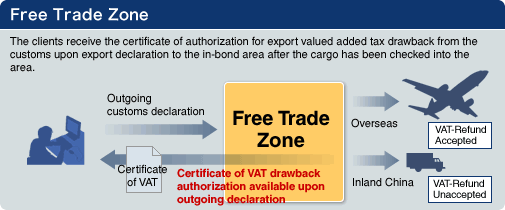Shanghai free trade zone
Shanghai free trade zone (FTZ), also known as an export processing zone (EPZ), is a product of globalization. An FTZ is a specially designated area for export-oriented foreign direct investment. Subsequently, most tariff and low-tariff barriers are wiped out by using agreements of suggests and investments are incentivized. These incentives usually include the waiver of customs and tariffs, the suspension or curtailment of laws in areas such as environmental protection and labor rights, and the facilitation of licensing procedures for foreign companies to set up local operations. Additionally, host countries often develop infrastructural support in areas such as transportation and telecommunications to support FTZs.
FTZs can become constructed only to guide a particular field if you can get only distinct natural and organic options available for purchase. An example would be the Onne Petrol and Oils Free Zone in Nigeria. Furthermore, there are other advantages to a precise at no cost operate region, on the grounds that field-selected and area-particular type of expertise are structured on the way to sector. Similar to an FTZ, actual agreements between trading partners such as the North American Free Trade Agreement would be the next step to completely removing tariff and non-tariff barriers between states. Generally, an FTZ describes foreign exporting zones in less industrialized nations, such as Bangladesh, that seek to attract multinational corporations and investment into their respective zones. In one way, FTZs demonstrate the benefits of free trade.
These zones provide corporations with favorable investment conditions, while at the same time providing developing nations with vital capital, the ability to export, jobs that would otherwise not exist or would exist somewhere else, and, in some cases, the transfer of technology from multinationals to local industries in the host country. Developing nations can have somewhat of a comparative advantage that they would not normally have through the use of free trade zones. There are various criticisms of FTZs, but the truth is. Some say that multinationals unfairly exploit the developing nations that offer the most incentives and have an unfair advantage over them. Also, these corporations exploit local communities through adverse trading relationships, unfair labor practices, environmental degradation, lack of transfer of technology, and lack of long-term commitment in the host country. Furthermore, the outsourcing that FTZs encourage has led to a drain of manufacturing capabilities in already industrialized nations such as the United States.
The strongest criticism of FTZs comes from the globalized organized response to the ill effects of exported capitalism to the rest of the world. FTZs have mobilized people across borders who are opposed to the human and eco costs of international free trade policies. Anti-World Trade Organization (WTO) protests, socialist movements, and global social justice businesses and systems such as the “Make Trade Fair” campaign have highlighted the high price humans in developing countries have paid in these zones,World Newspapers, as well as the long-term economic costs associated with creating, maintaining, and improving such zones. FTZs can range from clothing assembly to electronics assembly. In the past, FTZs bring in companies that are labour serious or physically intense besides concept based primarily, mainly considering nervous about challengers. In spite of this, Taiwan and Korea and Ireland have all managed to create FTZs where high-tech companies have flocked to, and high salaries and the transfer of that high technology have followed. FTZs are not governed by a wealthiest particular body.
Instead, each state provides a different package of incentives and regulations. Conversely, multinationals continue to motivate host international locations to improve their incentives and in order to deregulate. In the pursuit of offering the most attractive package, host countries will try to make their package the most attractive, thereby creating a standard among them. In turn, the china online marketing working conditions of the workers in “sweatshops” become worse, and so nongovernmental organizations (NGOs) such as the International Labour other individuals and Agency eventually push for minimum global standards for labor practices. FTZs are complex, since they are each dynamic in their own way. They provide the benefits of globalization to both developed nations (companies that are headquartered there) and developing ations, but provide more benefits to developed nations at the expense of the developing ones.
visit us for more http://www.ucbchinaconsulting.com/china-company-setup-types/shanghai-free-trade-zone


